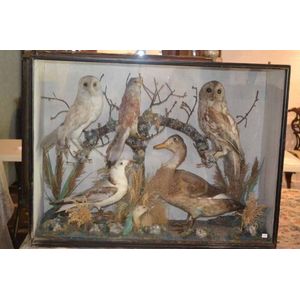Victorian Animal Diorama with Owls and Duck
A Victorian ornithological / Animalia, diorama, taxidermy, figure group, late 19th century, including Owls, duck and various taxidermy subjects, housed in glass display case. Height 72 cm. Width 95 cm. Depth 26 cm
You must be a subscriber, and be logged in to view price and dealer details.
Subscribe Now to view actual auction price for this item
When you subscribe, you have the option of setting the currency in which to display prices to $Au, $US, $NZ or Stg.
This item has been sold, and the description, image and price are for reference purposes only.
- Diorama - When used in relation to antiques and collectables, a diorama is a three dimensional display, usually within a domed or rectangular glass case.
As the feathers of birds are more easily damaged than the skin of an animal, most taxidermied birds are displayed within a glazed diorama. The birds will be set in lifelike poses in a naturalistic landscape, usually standing a branch within the diorama. Animals will be displayed set in the landscape they inhabit. The foreground will be set with gravel, rocks and bushes, while the background will be painted.
While most natural history dioramas can be easily picked up and carried by one person, some larger examples were made that were suitable for display at exhibitions.
The other type of diorama commonly seen is a model ship enclosed in a rectangular glass box, the ship depicted floating on the sea. - Victorian Period - The Victorian period of furniture and decorative arts design covers the reign of Queen Victoria from 1837 to 1901. There was not one dominant style of furniture in the Victorian period. Designers used and modified many historical styles such as Gothic, Tudor, Elizabethan, English Rococo, Neoclassical and others, although use of some styles, such as English Rococo and Gothic tended to dominate the furniture manufacture of the period.
The Victorian period was preceded by the Regency and William IV periods, and followed by the Edwardian period, named for Edward VII (1841 ? 1910) who was King of the United Kingdom and the British Dominions and Emperor of India for the brief period from 1901 until his death in 1910.
This item has been included into following indexes:
- natural history and taxidermy, bird specimens - owls, boobook, frogmouth etc. 26
- natural history and taxidermy, dioramas and cased exhibits
Visually similar items

A large Balinese polychrome carved wall panel, 20th century, 60 x 85 cm
Sold by
in
for
You can display prices in $Au, $US, $NZ or Stg.

A French tapestry. depicting a romantic scene in a lush classical garden, (some losses), 289 x 284 cm
Sold by
in
for
You can display prices in $Au, $US, $NZ or Stg.

A French tapestry, depicting a romantic scene in a lush classical garden, (some losses), 289 x 284 cm
Sold by
in
for
You can display prices in $Au, $US, $NZ or Stg.

A French brass three fold fire screen with fire irons.
Sold by
in
for
You can display prices in $Au, $US, $NZ or Stg.
